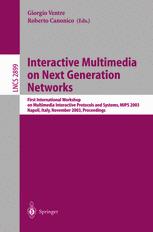

Most ebook files are in PDF format, so you can easily read them using various software such as Foxit Reader or directly on the Google Chrome browser.
Some ebook files are released by publishers in other formats such as .awz, .mobi, .epub, .fb2, etc. You may need to install specific software to read these formats on mobile/PC, such as Calibre.
Please read the tutorial at this link: https://ebookbell.com/faq
We offer FREE conversion to the popular formats you request; however, this may take some time. Therefore, right after payment, please email us, and we will try to provide the service as quickly as possible.
For some exceptional file formats or broken links (if any), please refrain from opening any disputes. Instead, email us first, and we will try to assist within a maximum of 6 hours.
EbookBell Team

4.1
10 reviewsMultimedia Interactive Protocols and Systems (MIPS) is the brand new name of a workshop that has been successfully held for the ?rst time in 2002 in Coimbra, as the ?rst joint edition of two well established series of workshops: Interactive Distributed Multimedia Systems (IDMS) and Protocols for Multimedia Systems (PROMS). The area covered by Multimedia Interactive Protocols and Systems is indeed broad, since it includes technical and practical issues related to d- tributed multimedia technologies, applications and services, with emphasis on their deployment over next generation networks. The topics set for MIPS 2003 were: mobile and wireless multimedia systems; multimedia middleware and communication protocols; Quality of Service issues; resource management for multimedia services; active and programmable netw- king for multimedia applications; mobile agents for multimedia; multimedia d- tribution and transport; tra?c engineering and service engineering; ubiquitous computing; networked audio-video devices; development tools for distributed multimedia applications; multimedia applications such as video-on-demand, - gital video libraries, video games, virtual community, teleworking, teleteaching, e-commerce, virtual reality simulations; performance of protocols and applica- ons;contentmanagement;serviceaccess;security,authentication,privacy,wat- marking; accounting and tari? policing for multimedia teleservices; multimedia encoding and compression. The Call for Papers attracted more than 130 submissions from Europe, Asia and the Americas, covering most of the proposed topics. With the help of a very dedicated Program Committee and of a number of associate reviewers, subm- sions were carefully evaluated, with an average of three reviewers for each paper.